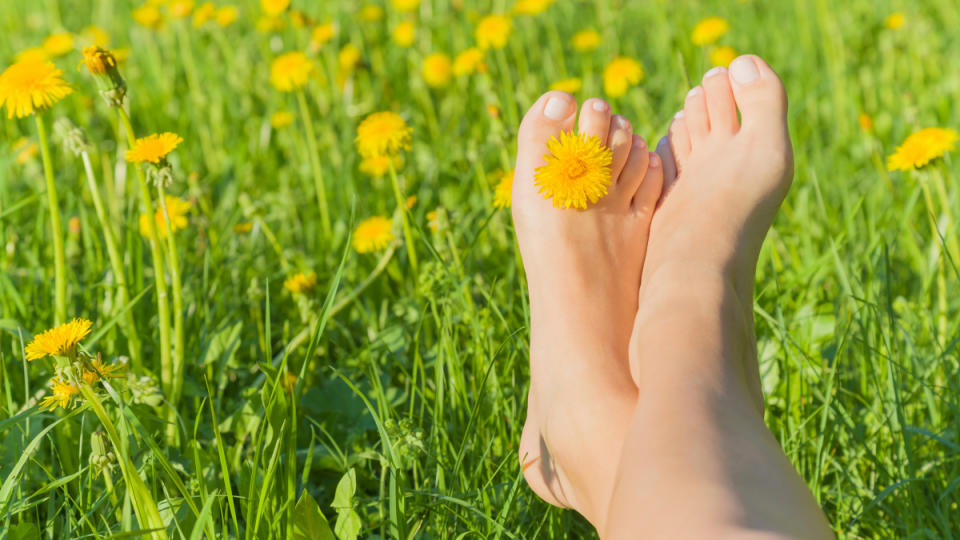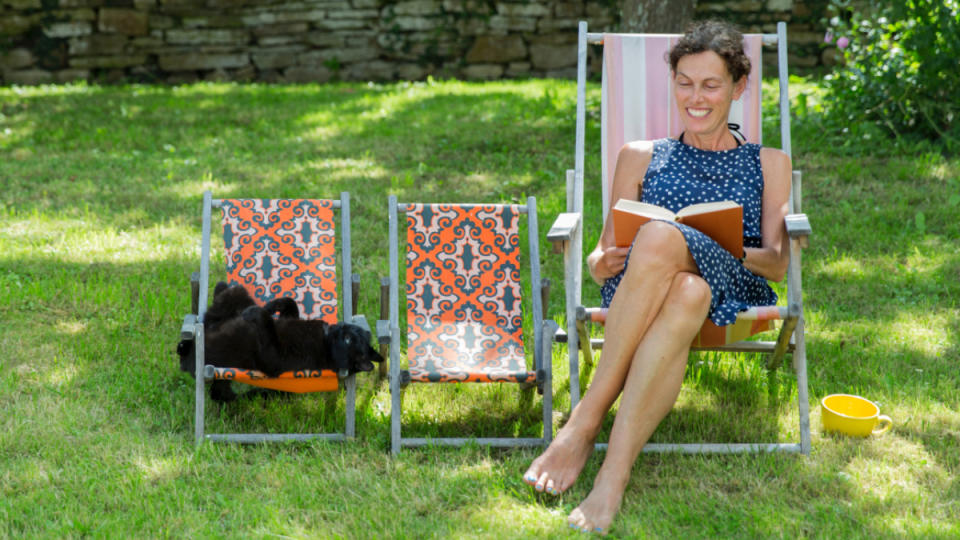Experts Reveal How to Tap Into the Benefits of Walking Barefoot for Less Pain + Deeper Sleep
Wiggling your toes in freshly-cut grass or sun-warmed sand feels oh-so-good. But the benefits of walking barefoot extend far beyond the sensory. A study in the Journal of Biomedical Science found that barefoot walking and other "grounding" techniques put you in direct contact with the Earth’s electrical charge. While that might not sound noteworthy, grounding has the power to ease inflammation, deepen sleep, lift your mood and more. Ready to get started? We've rounded up all you need to know about the benefits of walking barefoot.
What are grounding techniques?
Grounding, also known as "Earthing", floods your body with electrons from the Earth. This natural, negative electric charge counteracts free radicals — molecules responsible for inflammation and disease.
Clint Ober, founder of the Grounding Movement and co-author of Earthing: The Most Important Health Discovery Ever, says that up until the 1960s, most people regularly practiced grounding without even knowing it. Folks either walked barefoot from time to time or wore leather-soled shoes, both of which made it easy to absorb the planet’s abundant electrical energy.
But that’s all changed. These days, most shoes have plastic or rubber soles, and we spend significantly less time outdoors. As a result, Ober says we're more prone to illness and blue moods. Plus we're often less in tune with our bodies.

Benefits of walking barefoot: getting started
Grounding techniques aim to reestablish our connection with Mother Earth. There are several ways to get started, including:
Walking barefoot
Planting your bare feet on the ground
Lying down on grass or sand
Walking outdoors with leather-soled shoes
All of these activities allow for energy transfer. In other words, they ensure your body can access the planet’s electrical charge. But even if you’re unable to do the above, simply reconnecting with nature can lift your mood and improve your health, too.
“Your options to ground yourself are infinite,” says Karen Sibal, MA, FMCHC, a functional medicine certified health coach and the author of The Little Book of Grounding. “Just spend some time in nature every day doing whatever you love.”
For example, Sibal suggests:
Hugging a tree
Going for a hike
Fishing
Canoeing
Taking a bike ride
Mowing your lawn
Planting some flowers
Shoveling snow
Lying down on the grass

Benefits of walking barefoot and other grounding techniques
Absorbing the Earth’s electrical charge can have profound benefits, especially when it comes to reducing the risk of inflammation and chronic disease. In fact, researchers noted that “grounding [techniques] may soon become one of the premier preventative and therapeutic antidotes” for various health problems. That includes diabetes, heart disease, chronic inflammation and more. Here are some of the top benefits of walking barefoot:
1. Less pain and inflammation
More than 20% of US adults suffer from chronic pain. Over-the-counter anti-inflammatory medications can offer relief. But for some, they can come with unwanted side effects like GI upset. Grounding techniques, on the other hand, provide a safe alternative.
A study in the Journal of Inflammation Research found that grounding techniques offered some relief from pain and inflammation. And for one study participant, an 84-year-old woman with non-healing diabetic wounds, the results were especially profound.
After just one 30-minute grounding session, the woman reported a noticeable decrease in pain. Following a week of daily grounding, her pain was reduced by 80%. And after two weeks, she reported being entirely pain-free.
Ober says he’s experienced similar results in his own grounding practice. “I grew up as a cowboy and have done everything you possibly could to injure yourself. After I started grounding, my chronic pain began to diminish.” (Tip: If foot problems make it painful to stroll, click through to see our best bunion self-care remedies.)
2. A brighter mood
“Engaging with the outdoors, including activities such as barefoot walking, can offer profound psychiatric benefits,” says Cassandra Boduch, MD, a board-certified psychiatrist and Chief Medical Officer at PsychPlus. “Exposure to nature has been linked to reduced stress, anxiety and depression. Similarly, spending time outdoors promotes increased levels of serotonin, the neurotransmitter associated with mood regulation.”

Research backs this up. One study in the International Journal of Environmental Research and Public Health found that guided nature activities, like walking barefoot in the forest, offered psychological benefits. Specifically, they increased positive feelings (like hope and happiness) and decreased negative ones. Another study in the Journal of Ecopsychology found that participants who regularly walked barefoot outside felt more relaxed and connected to nature. (Click through to see more easy ways to reduce cortisol, your body's stress hormone.)
3. Better sleep
Have you ever noticed that you sleep like a baby after a day of hiking, gardening or lounging at the beach? You might attribute those Zzzs to exhaustion, but nature could be the real reason for sounder sleep.
Case in point: a study in Healthcare had participants lie on the ground or walk barefoot for 30 minutes, five times a week. By the end of the study, researchers found that these grounding techniques significantly improved sleep quality.
Another study in the Journal of Alternative and Complementary Medicine found that participants who slept on a grounding mattress pad — a mat that transfers electrons from the ground to the mattress through a wire — experienced a reduction in cortisol levels. Why that's important: High levels of cortisol, a stress hormone, have been linked to sleep problems. But grounding techniques that expose you to the Earth’s electrical charge help tame stress and promote deeper sleep. (Click through to learn how walking helps reverse Ozempic tiredness, too.)

Related: This Ancient Herb Can Ease Anxiety, Improve Sleep, Boost Weight Loss and More
4. A healthier heart
The benefits of walking barefoot may extend to your ticker, too. That’s great news, considering that 60 million American women are living with some type of heart disease. Although the research is still in its infancy, contact with the Earth’s electrical current seems to prevent red blood cells from clumping — a common cause of heart attacks and strokes.
A study in the Journal of Alternative and Complementary Medicine found that grounding increased the surface charge on red blood cells, reducing blood viscosity and the risk of clots. These findings led study authors to conclude that grounding techniques could be a simple, yet profound, intervention for reducing the risk of heart disease.

Related: How to Prevent Heart Disease: These 5 MD-Backed Shortcuts Are Too Easy Not to Try
5. Fewer autoimmune flare-ups
Of the 50 million Americans living with autoimmune disease, 75% are women. Autoimmune disorders like multiple sclerosis (MS), celiac disease and rheumatoid arthritis (RA) can be debilitating, but grounding may prove beneficial.
A review in Explore: The Journal of Science & Healing found that a growing number of doctors are prescribing barefoot walking and other grounding techniques to help patients with autoimmune conditions. That’s because grounding lowers the body’s stress response, which is one of the most common cause of autoimmune disease flare-ups.
You can maximize the benefits of walking barefoot
To get the most benefits of walking barefoot, Sibal recommends making grounding techniques part of your morning routine. “Mornings are best so you can start your day feeling grounded and balanced,” she says. “Walk barefoot on the grass if you can, or do some gardening. Just get outside and cultivate a sensory awareness of your environment.”
Ober echoes this advice, adding that you don’t even need to move at all if you don’t feel like it. “The number one thing I promote is going outdoors, taking off your shoes and finding a chair," he says. "Plant your feet on the ground and sit for 15 to 30 minutes.”
He explains this simple practice puts you back in your natural state while exposing you to the planet’s beneficial electrical charge.

How often should you practice grounding techniques?
The benefits of walking barefoot and other grounding techniques are cumulative, so it takes days or even weeks of practice for them to add up. To ensure you reap the rewards, Sibal advises practicing grounding techniques daily. “It usually takes about 21 days to form a new habit and begin seeing results," she notes. "I recommend getting outside for 15 to 20 minutes a day, but even 5 to 10 minutes each day will give you some benefits. Do it consistently and the rewards will follow.”
How to get the benefits of walking barefoot year-round
Going outside and walking barefoot isn’t always an option, especially when it's rainy or cold. But that doesn’t mean you can’t benefit from grounding techniques year-round.
Ober and Sibal both say grounding products, such as grounding mats, can produce similar beneficial effects. “These mats come with an electrical cord that you plug into a socket,” Sibal says. “They provide similar benefits to what you’d get connecting with the Earth’s electrical charge outdoors.”
Also smart: Bringing the outdoors in. For example, Sibal says you could buy houseplants or put fresh flowers in a vase. Likewise, she notes that “a water feature, like a tabletop fountain, can promote tranquility." While these activities don’t put you in direct contact with the planet’s electrons, they expose you to nature, which can prevent stress and help you relax. (Click through to see our picks for the best indoor plants.)
For more on the health benefits of reconnecting with nature:
The Easiest Way to Dramatically Boost Your Mood? Birdsong! The Science that Proves It
6 Easy Houseplants That Are Low-Maintenance Wonders, According to Plant Pros
This content is not a substitute for professional medical advice or diagnosis. Always consult your physician before pursuing any treatment plan.
